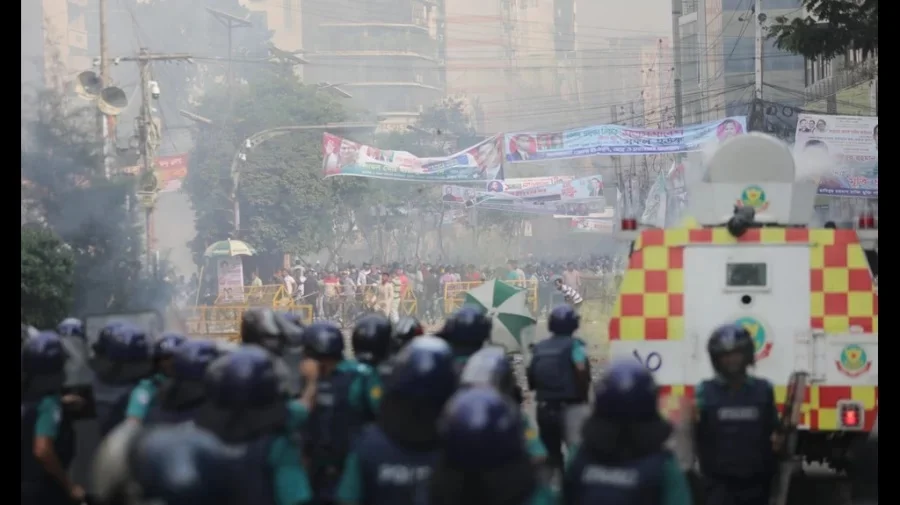Int’l rights organizations urge restraint against protesters in Bangladesh
Share on:

Police and BNP men face off in Naya Paltan, Dhaka, on Saturday, October 28, 2023.
Bangladesh authorities must immediately cease resorting to violence and excessive use of force to suppress protests, several international organizations working on human rights have demanded.
Anti-Death Penalty Asia Network, Capital Punishment Justice Project, International Federation for Human Rights, International Rehabilitation Council for Torture Victims, Omega Research Foundation (Omega), Redress, Robert F Kennedy Human Rights and World Organisation Against Torture voiced their concern in a statement on Monday.
The organizations said they “wish to express our deep concern over the alarming and distressing developments in Bangladesh, in the context of the rallies and demonstrations co-organized by the opposition parties and led by the Bangladesh Nationalist Party (BNP).”
The BNP organized a massive rally in Dhaka on October 28 to demand Prime Minister Sheikh Hasina and her government resign and the facilitation of a free and fair general election by a non-partisan independent administration.
“As the set date approached, reportedly over 1,200 political activists and leaders were arrested in different parts of the city, including their homes. Moreover, the Bangladesh Telecommunication Regulatory Commission (BTRC) ordered an internet shutdown from 11am to 8pm on October 28,” the organizations claimed.
“Recent reports indicate that during the rally on October 28, Bangladeshi authorities used excessive force, and at least three people were killed (a policeman, a BNP activist and journalist Rafiq Bhuiyan). As of the morning of October 31, at least 11 people had died, and hundreds had been injured in connection with the protests in different cities.
“While there are also reports of violent reactions from protesters, this is an example of the extreme measures taken by law enforcement agencies to quash dissent. We are profoundly shocked by this loss of life and the escalation of violence during these protests.”
After the demonstrations, the police visited the residences of BNP leaders and arrested Secretary General Mirza Fakhrul Islam Alamgir.
They said they also found reports of “arbitrary arrests” of over 500 BNP members and supporters deeply troubling.
“These actions severely suppress political expression and raise serious concerns about the safety and well-being of those detained. We particularly fear that detainees may be subjected to physical and psychological torture and ill-treatment, which has been a longstanding and widespread practice in Bangladesh.”
Saying that the Bangladeshi government had persistently used excessive force to suppress dissent and punish political opponents, they added that the situation went beyond targeting political opposition and extended to the excessive use of force against readymade garment workers demanding an increase in their pay.
“…at least two labour leaders have lost their lives due to police gunfire, and scores have sustained injuries during protests.”
The rights organizations called on the government of Bangladesh to immediately stop the use of violence and excessive force against protesters and to ensure that the rights to freedom of expression, freedom of peaceful assembly, liberty and personal integrity were respected and protected.
“We urge the international community to monitor the situation in Bangladesh closely and to engage with the government to ensure that these human rights violations are brought to an end.”
“In particular, the United Nations member states must raise these concerns during the fourth cycle of the Universal Periodic Review (UPR) on Bangladesh, taking place on November 13, 2023, since the current human rights abuses result from a pattern of violence and repression of dissidents in the country, as noted in the alternative reports submitted by human rights organizations leading up to the UPR.”

